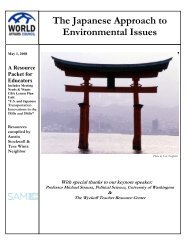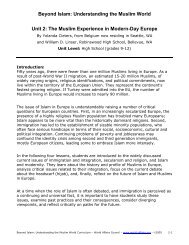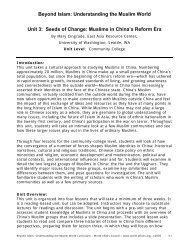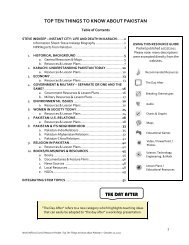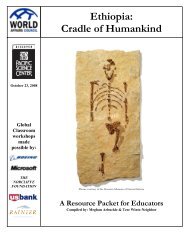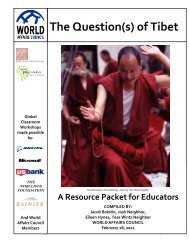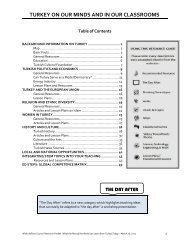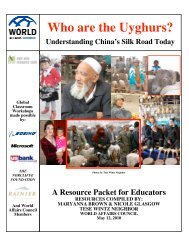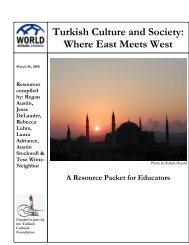If King Tut Could Talk - World Affairs Council
If King Tut Could Talk - World Affairs Council
If King Tut Could Talk - World Affairs Council
- No tags were found...
You also want an ePaper? Increase the reach of your titles
YUMPU automatically turns print PDFs into web optimized ePapers that Google loves.
History and Background of Modern EgyptCountry ProfileThe regularity and richness of the annual Nile River flood, coupled with semi-isolation provided by deserts to theeast and west, allowed for the development of one of the world's great civilizations. A unified kingdom arose circa3200 B.C., and a series of dynasties ruled in Egypt for the next three millennia. The last native dynasty fell to thePersians in 341 B.C., who in turn were replaced by the Greeks, Romans, and Byzantines. It was the Arabs whointroduced Islam and the Arabic language in the 7th century and who ruled for the next six centuries. A localmilitary caste, the Mamluks took control about 1250 and continued to govern after the conquest of Egypt by theOttoman Turks in 1517. Following the completion of the Suez Canal in 1869, Egypt became an important worldtransportation hub, but also fell heavily into debt. Ostensibly to protect its investments, Britain seized control ofEgypt's government in 1882, but nominal allegiance to the Ottoman Empire continued until 1914. Partiallyindependent from the UK in 1922, Egypt acquired full sovereignty with the overthrow of the British-backedmonarchy in 1952. The completion of the Aswan High Dam in 1971 and the resultant Lake Nasser have altered thetime-honored place of the Nile River in the agriculture and ecology of Egypt.A rapidly growing population (the largest in the Arab world), limited arable land, and dependence on the Nile allcontinue to overtax resources and stress society. The government has struggled to meet the demands of Egypt'sgrowing population through economic reform and massive investment in communications and physicalinfrastructure. Egyptian youth and opposition groups, inspired by events in Tunisia leading to overthrow of thegovernment there, organized a "Day of Rage" campaign on 25 January 2011 (Police Day) to include non-violentdemonstrations, marches, and labor strikes in Cairo and other cities throughout Egypt. Protester grievancesfocused on police brutality, state emergency laws, lack of free speech and elections, high unemployment, risingfood prices, inflation, and low minimum wages. Within several days of the onset of protests, President Mubarakaddressed the nation pledging the formation of a new government, and in a second address he offered additionalconcessions, which failed to assuage protesters and resulted in an escalation of the number and intensity ofdemonstrations and clashes with police. On 11 February, recently appointed Vice President Suliman announcedMubarak's resignation and the assumption of national leadership by the Supreme <strong>Council</strong> of Armed Forces(SCAF). The SCAF dissolved the Egyptian parliament, suspended the nation's constitution, and formed acommittee to recommend constitutional changes to facilitate a political transition through democratic elections.In early March, Essam Sharaf replaced Ahmed Shafik as Prime Minister and by mid-month a constitutionalreferendum was approved. In early July, the SCAF announced that elections for parliament would take place inSeptember, but the date was later changed to November, and was to be followed by a redrafting of theconstitution and a presidential election. In July 2011, opposition discontent over the slow pace of SCAF progress intransitioning the government led to a resumption of protests in Cairo and over a dozen other cities; less frequent,smaller demonstrations and protests continued through October. Following the arrest of Mubarak and other highrankingofficials in mid-April, a trial in which Mubarak is accused of corruption and complicity in the deaths ofnearly 900 protesters began in early August, was temporarily suspended in September, and is scheduled toresume in late December. Presidential elections held in May and June witnessed the victory of MuslimBrotherhood candidate Mohammed Mursi over former Prime Minister Ahmed Shafiqhttps://www.cia.gov/library/publications/the-world-factbook/geos/eg.htmlBBC: Egypt Profilehttp://www.bbc.co.uk/news/world-africa-13313370Library of Congress: A Country Study–Egypthttp://lcweb2.loc.gov/frd/cs/egtoc.htmlEgypt’s Official National Websitehttp://www.egypt.gov.eg/english/U.S. Department of State’s Background Notes on Egypthttp://www.state.gov/p/nea/ci/eg/https://www.cia.gov/library/publications/the-worldfactbook/geos/eg.html<strong>World</strong> <strong>Affairs</strong> <strong>Council</strong> Resource Packet: Pacific Science Center Presents—The Golden <strong>King</strong> and the Great Pharaoh: November 1, 201225



